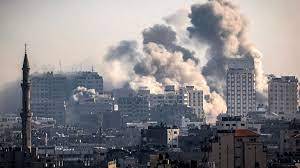Smoke rises from buildings in Gaza after being hit by Israeli airstrikes.

For weeks, El Helbawi followed the news closely. Images and videos posted on social media broke her heart – entire neighborhoods reduced to rubble; doctors struggling to treat patients without medicine; parents mourning the deaths of their children.
Then on October 27, as Israel prepared to expand its ground operations, Gaza fell silent.
“We regret to announce a complete disruption of all communication and internet services with the Gaza Strip in light of the ongoing aggression,” Paltel, the leading telecommunication company in the Palestinian territories, said in a statement. It was the first of several blackouts to strike Gaza.
Fearful that a blackout could provide cover for “war crimes,” El Helbawi became consumed with finding a solution.
At first, she joined others on social media platform X, calling for Elon Musk to deliver his Starlink satellite internet service to Gaza – and was excited when Musk said he would. But when talks on those plans stalled, El Helbawi decided to try something else.
At the suggestion of a social media follower, she purchased an eSIM with roaming service and had a friend try to connect to a foreign network. To her surprise, it worked.
“I felt it in my whole body the moment we realized there was hope – even if it was very small hope – that we found a solution,” El Helbawi said. “It was the light at the end of a very dark tunnel.”
Within 24 hours, she posted on X and Instagram asking followers who wanted to help restore telephone and internet for Palestinians to donate eSIMs by purchasing them online and sending her the QR codes. El Helbawi felt confident she could find people in Gaza with service to distribute the eSIMs throughout the territory.
Giving voice to victims
As El Helbawi began executing her plan, Ahmed Elmadhoun was in Gaza struggling with how to report on the war without telephone or internet service.
As one of the few journalists on the ground, Elmadhoun felt obligated to keep the world informed of the latest news, sharing photos and videos of the aftermath on social media.
“It’s a significant responsibility,” Elmadhoun, 27, told CNN. “People here are dying in silence, and no one can hear them. We are the voice of all these victims.”




No comments yet
Be the first to share your thoughts!